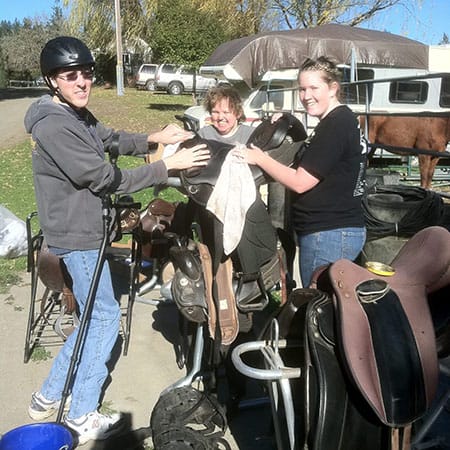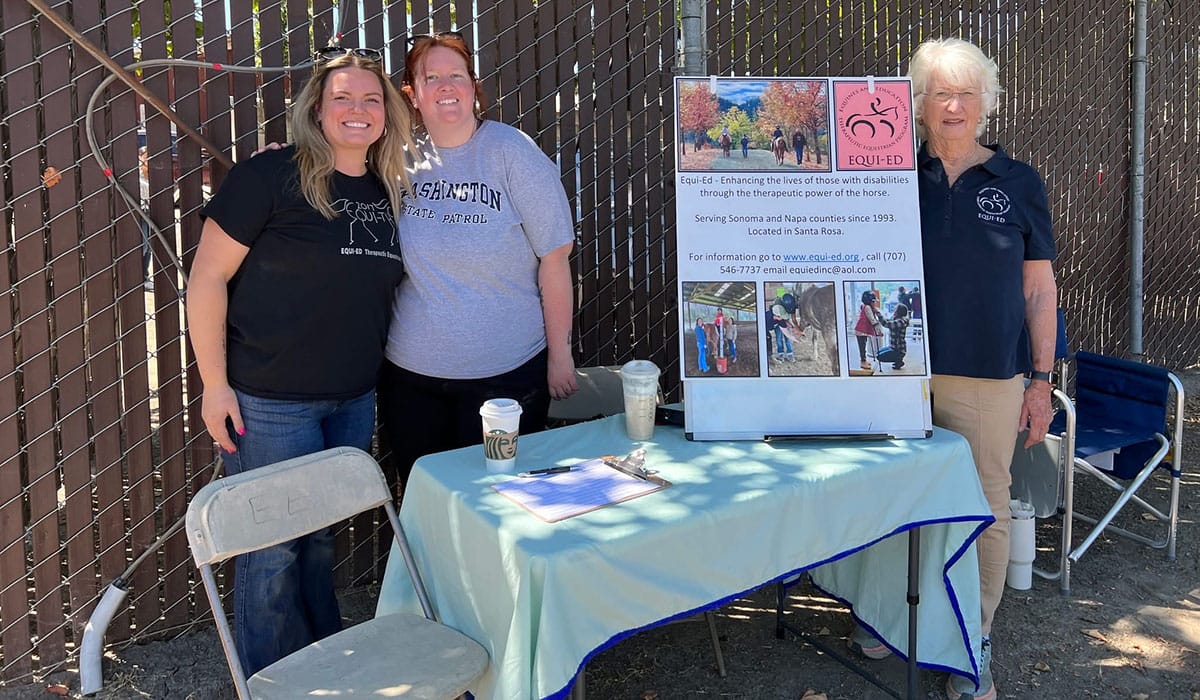Lifelong Volunteer Coordinates Therapeutic Horseback Riding Program

Meet Daily Point of Light Award honoree Jessica Farber. Read her story, and nominate an outstanding volunteer or family as a Daily Point of Light.
Jessica Farber has always been an animal lover. Even today, she keeps two cats, Indiana and Gotham —the former she jokes is a foghorn. But she was captivated by horses as a 9-year-old when she tagged along with a friend to a therapeutic riding program called Equi-Ed. It was her first experience with them, but it wouldn’t be the last.
For over two decades, Jessica has been an Equi-Ed volunteer. Today, she volunteers on site and coordinates 30 to 40 volunteers—and many who fill in sporadically—on top of her full-time job at a financial institution. From serving as a side walker for lessons to caring for horses, colleagues estimate Jessica has walked over 900 miles, donated over 10,000+ hours in service of the horses and students and scooped tons of manure.
With nine horses and around 20 riders—aged 5 years old to 50s—the small staff relies on volunteers to keep things running smoothly. Riders with a wide range of emotional, physical and developmental challenges thrive in the supportive environment. And volunteers like Jessica, someone who enjoys solving problems and with an affinity for puzzles, is vital to its success.
What inspired you to get started with this initiative?
I accompanied a childhood friend to one of her lessons, and it became a weekly thing. I would go with her and, while she was riding, would do chores. That’s how it started. Also, my mom worked in the school district with our founder, so they knew each other a bit.

Tell us about your volunteer role with Equi-Ed.
I’m the volunteer coordinator, so my day-to-day is usually via phone and email, unless I’m on the property. I do a lot of little things. I maintain the schedule for all of the volunteers. If we’re in between lesson sessions, I schedule people to do chores. I maintain a contact list and volunteer paperwork and send out weekly announcement emails. I’m the main point of contact, so if someone’s ill or on vacation and they need a substitute, they reach out to me. I’ll sometimes fill in. On Saturday mornings, I assist in lessons—horse handling, side walking, grooming and tacking horses before and after—and I feed Monday, Wednesday and Friday nights. Caring for horses also involves cleaning stalls, turning them out to pasture for the day and bringing them back in, filling water and other responsibilities..
How has that role changed over the years?
I started as a volunteer and a rider, and just before I turned 20, I started working in a paid role, doing chores every morning. Then, we got a full-time person for that, so I went back to just volunteering. I was assisting our program manager, sending out emails and doing some of the stuff that I do now. That brings me up to when I moved to Washington for three years.
I was already the go-to person. Now, after moving back and starting up again, the title just comes along with a bit more responsibility. It allows me to connect to people that I may not see on days I’m on the property. I still get to talk to them, which is my favorite part.
What’s been the most rewarding part of your work?
I’ve had a lot of first-time students who have never been on or around a horse. They’re shy and timid. It’s nice to see them open up a bit, and now, you can’t get them off the horse. That’s always been my favorite part with the students—seeing them go from being wallflowers to open, spunky little kids.
One of my volunteers started off as a student when she was 7 or 8, shy and a little scared. Now, she volunteers every Saturday, and she still rides. She’s like a completely different person. It’s really helped with her anxiety and the inner things that a lot of us deal with. I have another rider who has muscle and balance problems, so the movement of the horse helps warm up their muscles to give them a nice stretch. This is particularly helpful for people if, for example, they’re paralyzed, and it helps their balance.
What have you learned through your experiences as a volunteer?
Basically, everything that I know about the horse world. I’d always loved horses, but I came in with no knowledge of them. It’s also nice from a therapeutic riding perspective, to be able to know why we match certain horses to certain riders. For instance, we have a horse named Mike, and he might be the best suited for this particular rider, because Mike has these particular qualities. It’s like learning the personalities of the riders. Horses also have their own personalities and strengths.

Tell us about future partnerships, programs or events that you are excited about.
Every year, we participate in the Calistoga Fourth of July parade. That was where our founder lived, so a lot of people in that community know us. It’s a fun way to get the students out. They ride in the back of the truck and decorate. We’re also going to be riding in a horse show dedicated to riders with disabilities, though it hasn’t been set in stone just yet.
Why is it important for others to get involved with causes they care about?
From my experience working with Equi-Ed, I’ve seen how much good it can do. I’ve seen how much our riders have benefited. It helps me too. It’s good for my soul. A lot of our volunteers are only out there for a few hours a week. It’s not that much of anyone’s time. So, anyone who can volunteer should.
What do you want people to learn from your story?
I found something that I’m really passionate about, and I found a way to get involved that helps other people. That adds to the joy it brings me. If you find something that you’re passionate about, see if there’s a way you can do something that incorporates that while helping others.
Do you want to make a difference in your community like Jessica? Find local volunteer opportunities.